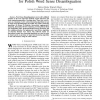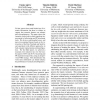25 search results - page 3 / 5 » Syntactic Features for High Precision Word Sense Disambiguat... |
CICLING
2006
Springer
13 years 9 months ago
2006
Springer
The disambiguation of verbs is usually considered to be more difficult with respect to other part-of-speech categories. This is due both to the high polysemy of verbs compared with...
COLING
2008
13 years 7 months ago
2008
In this paper, an extension of a dimensionality reduction algorithm called NONNEGATIVE MATRIX FACTORIZATION is presented that combines both `bag of words' data and syntactic ...
TAL
2004
Springer
13 years 11 months ago
2004
Springer
This paper presents an algorithm to apply the smoothing techniques described in [1] to three different Machine Learning (ML) methods for Word Sense Disambiguation (WSD). The method...
IMCSIT
2010
13 years 3 months ago
2010
Word Sense Disambiguation in text is still a difficult problem as the best supervised methods require laborious and costly manual preparation of training data. Thus, this work focu...
ACL
2008
13 years 7 months ago
2008
To date, parsers have made limited use of semantic information, but there is evidence to suggest that semantic features can enhance parse disambiguation. This paper shows that sem...


